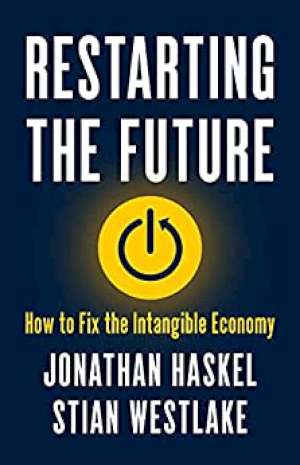25 July 2022
Restarting the Future
How to Fix the Intangible Economy
Jonathan Haskel and Stian Westlake
2022, Princeton University Press, 320 pages,
ISBN 9780691211589
Reviewer: Vicky Pryce

It’s so good to see a new collaboration between Jonathan Haskel and Stian Westlake following their joint 2017 book: ‘Capitalism without Capital: The Rise of the Intangible Economy’. They have both been advocates for a long time now in their various roles for looking more closely at measuring the contribution of intangibles to GDP, productivity and hence longer -term prosperity, something which had been consistently misunderstood and underappreciated in economic theory and policy.
Of course they are right. And concerns about the inadequacy of current systems to deliver have if anything risen given the fact that we see in so many countries worrying symptoms of ‘stagnation, inequality, dysfunctional competition, fragility and inauthenticity’. It goes without saying that Covid and the war in Ukraine, which I suspect happened after the book was finished, have increased chances of stagnation being with us for some time and made operating in a fragile world more difficult. And it is true that despite all the IT and scientific start-ups and the rise of entry opportunities now offered by increasing digitalisation, it is the big boys who are able to take advantage of the benefits of globalisation and sweep up globally with little regulatory resistance, at least so far.
I did wonder though about the mention of inauthenticity’ as one of the 5 symptoms which we need to worry about. Well, as far as I understand it the term in this context implies basically the trend we have seen over the last few decades of the takeover of those who ‘manage’, at the expense of those who ‘do’- the makers and inventors. Not all would agree, especially those in the IT, advanced manufacturing and AI world who have been incredibly busy of late. But for many areas that is at the root of a rise in aspects of inequality we have been witnessing with intangible-rich elites leaving the masses behind. We see this in the current conundrum where it is workers in the financial and professional business sector in the UK who are getting above- inflation increases leaving the others behind.
What is more, as the authors observe, intangible investment has suffered since the financial crisis. And our institutions have not evolved in a way to encourage that investment from taking place. Yes, the innovative and scientific reaction to the Covid pandemic has shown that progress can be made at times of crisis. But it took decisions from entities outside the direct control of the public sector to get the initial momentum going.
So it goes without saying that more science and research funding is needed. Cities should be allowed to expand to allow for greater cross -fertilisation of ideas. Competition and IP policy need reform to allow more entrants and ensure a reasonable percentage can survive. Building state capacity to support the economy in its new phase is essential. This means that institutions need to change and adapt.
It all makes sense. However, one cannot but wonder whether any change can really happen while those same inadequate institutions are trying to cope with post Covid realities and fight the cost of living crisis and the repercussions from the Russian invasion of Ukraine which could be with us for some time to come. It’s worth nevertheless continuing to bang the drum for change…
